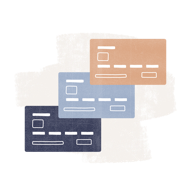Equipment Financing
Equipment financing is the use of a loan or lease to purchase or borrow hard assets for your business. This is one of the business financing options you can use to purchase or lease any physical asset, such as a restaurant oven or a company car.

Equipment Financing Details
Loan Amounts
$5,000 – $5 million
Interest rates
2% – 20% APR
Repayment Terms
12 – 72 months
Turnaround Time
As fast as 2 business days
Pros
- Relatively low APR
- Predictable monthly finance payments
- Helps build business credit
- Equipment serves as strong collateral
Cons
- Can require high down payment
- Requires strong credit for good terms
- Financed equipment can become outdated, but you are stuck with it at the end of your payment term
Get to know Equipment Financing
Gerri Detweiler • December 9, 2020
What is Equipment Financing?
Any tangible asset, other than property or a building, used in the operation of a business may be considered equipment. For example, desks, computers, a pizza oven, a dental X-Ray machine, and construction equipment are all considered business equipment and can be either purchased with an equipment loan, or leased.
Because the equipment you are purchasing is considered collateral, this is a financing option that allows a small business owner to finance the purchase of equipment even if they don’t have other assets that could be used as collateral.
Equipment Financing Offers
How Does Equipment Financing Work?
You can finance the equipment you are purchasing through the equipment dealer you are buying from, but it can pay to shop around. There are many banks, equipment financing companies, and other lenders that specialize in loans specifically for business equipment, including heavy machinery and vehicles.
With business equipment financing, because the equipment you are purchasing serves as collateral against the loan. Should you run short of money for a few months and be unable to continue paying your loan, the lenders have the right to seize that collateral to cover what you owe. The good thing about this is that you don’t have to find other assets to serve as your collateral.
Your application will be reviewed and lenders will look at your qualifications to determine what finance options they can offer you. They will present you with the interest rate you will pay on your loan, and if you agree to the financing terms, you’ll sign on the dotted line and start making monthly payments on your purchase.

Do you need more financing?
Sign up for Nav to see what financing options are available for your business.
Lease or Buy Equipment: Which is Best?
You have three options when it comes to obtaining equipment:
- Lease it
- Buy it
- Do a sale-and-leaseback
It’s important to consider what your use will be of the equipment you finance, and how long you expect to keep it.
When leasing equipment, you spend less up front, so if you don’t want to take out a large loan, you can keep costs down. You may be able to negotiate flexible lease terms with an equipment lease, and it’s easy to upgrade equipment after your lease ends, which comes in handy if your equipment is something like a computer that quickly becomes obsolete. Also, your lease payments may be tax-deductible.
One of the drawbacks to leasing is that, over time, you’ll spend more on the lease than you would have to buy the equipment outright. You don’t own it, so at the end of your lease, you’ll have to find another solution to replace it (or extend the lease, if that’s an option).
If you buy, the equipment is yours for its life. You can sell it if you no longer need it or want to replace it. There are tax incentives for business equipment that you can take advantage of over time.
Buying does, of course, cost you more up front. And if it becomes outdated quickly, you’ll have to replace it, and selling it won’t help you nearly recover what you paid for it.
As for the sale-and-leaseback option, you essentially sell the equipment to a lender for cash and lease the equipment back from them. At the end of the term, you can return the equipment or buy it from the lender.
Why consider this option? You get cash from selling the equipment to your lender, which you can use to operate or grow your business, and you still have access to the equipment. This may be cheaper than financing new equipment.
The drawbacks here are that your equipment is your collateral. If you default on the lease, your equipment will be repossessed. Also, you might not get as much as you hope for the sale of your equipment. Sale leasebacks usually work on a 2:1 ratio. If you want $150,000 in cash, you’ll have to have $300,000 in equipment value.

What You Need to Know About Equipment Financing
Pros of Financing Business Equipment
Pros
- Relatively low APR
- Predictable monthly finance payments
- Helps build business credit
- Equipment serves as strong collateral
Small business owners appreciate the low APR of equipment loans compared to other options, particularly credit card financing. You will typically see rates of 8-25%, though yours will depend on several factors (including your credit history).
Another perk of financing business equipment is that the loan (or lease) is typically tax-deductible. If you get a loan for, say, $200,000, it’s not treated the same as if you earned that amount in revenue, so it won’t be taxed.
An equipment loan can help you build your business credit history, which can help you qualify for other types of financing down the road. And with predictable monthly loan payments, you can ensure that cash flow is steady and that you won’t see a spike that will blow your budget.
If you’re leasing your equipment, you will save money up front, which also helps cash flow, and you can get access to the latest technology without paying full price.
If you haven’t been able to get your loan application approved for other types of financing because you don’t have collateral or great business credit scores, you may be more likely to get approved for an equipment loan, simply because the equipment you buy or lease is your collateral.
Cons of Financing Business Equipment
Cons
- Can require high down payment
- Requires strong credit for good terms
- Financed equipment can become outdated, but you are stuck with it at the end of your payment term
A business equipment loan isn’t for everyone. You may need high business credit scores to get a low APR, and it might require a sizable down payment. Financing business equipment is, of course, more expensive than paying for it with cash, so you also cut into your profit margin.
If you’re buying your equipment, you may end up with outdated equipment before you’ve even paid off your loan.
The costs of equipment financing are often lower than other flexible financing options. But don’t assume that’s the case. For example, you may be able to pick up a good piece of used equipment at a bargain price, pay with it using a low-rate business credit card, and come out ahead.
Find a business credit card that suits your needs in our business credit card marketplace.
Watch Out For:
Read the lease agreement carefully and don’t hesitate to get professional advice, especially for expensive equipment.
Among others, you want to avoid contracts that:
• Make it easy for the lessor to declare you in default• Have excessive fees
• Make it very difficult to avoid renewal of your lease
• Include unclear or unreasonable buyout or return terms at the end of the lease
Also keep in mind that the lessor will almost certainly file a UCC filing which will appear on your business credit reports. This isn’t necessarily negative, but you do want to make sure it is released when the lease is completed.

Best Uses for Equipment Financing
You can use an equipment loan for a wide range of capital equipment, from tractors to computers to industrial mixers. It’s great for specialized machines or medical equipment financing, or heavy equipment and high-tech tool leasing.
If you meet any of the following criteria, equipment leasing or financing could be a good fit:
- Businesses in need of equipment
- Businesses in need of working capital that have equipment
- Startups exploring financing options

100+ business credit cards in one click
Business credit cards can make sure you always have emergency cash on hand. Browse your top business credit card matches for free and apply in minutes!
Qualifying for Financing Business Equipment
The required qualifications for an equipment loan vary from lender to lender, but there are a few general requirements you should make sure you can meet before you start the application process:
- Be in business 12+ months
- Have personal credit score of 650+
- Have revenues of $50,000+
If you have strong business credit scores, so much the better, but if not, financial institutions will look at your personal credit scores instead. You can pull your business credit report to see what your scores are with Experian, Dun & Bradstreet, and Equifax before you apply.
And if you don’t meet the requirements above, not to worry; you may still qualify for an equipment loan with a down payment of 5-25% of the loan value.
Expect to be asked for ID (your driver’s license will work) and proof of your role at your company.
You may be asked for a business plan that includes how you will use the funds for equipment for your business, as well as a profit and loss statement and possibly a balance sheet or cash flow statement. If your business is young, you may also need to provide information on your personal finances.
Based on all the information provided, the lender will review and determine your credit approval and APR. You’ll be presented with equipment financing options and terms. Most loans have terms of a few months up to 10 years, depending on the amount.
Nav’s Verdict: Equipment Financing
Overall, equipment financing solutions are fairly accessible to small business owners, even those without a stellar credit history, since the equipment is your collateral. If you’re looking for a long-term equipment purchase or shorter-term equipment leasing, shop with financing partners like your bank, alternative lenders, lenders who specialize in equipment financing, or lenders who work with the equipment vendor to find the lowest cost option with the best terms for your business equipment loan.
And remember: a little legwork before you fill out your equipment finance application can increase your odds of getting approved.
Related Resources
- SBA Loans
- Bank loans
- Merchant Cash Advance
- Microloans
- Cash Flow Loans
- Online Business Loans
- Construction Business Loans
- Retail Business Loans
- Restaurant Loans & Financing Options
- SBA 7(a) Loans
- SBA Express Loans
- Business Credit Cards
- Equity Crowdfunding
- Reward-Based Crowdfunding
- Equipment Financing
- Invoice Financing
- How Trade Credit Can Help Your Business
- Medical Practice Loans
- Manufacturing Business Loans
- Commercial Real Estate Loans
- SBA Microloans
- SBA 504 Loans
- SBA Disaster Loans
Have at it! We'd love to hear from you and encourage a lively discussion among our users. Please help us keep our site clean and protect yourself. Refrain from posting overtly promotional content, and avoid disclosing personal information such as bank account or phone numbers.
Reviews Disclosure: The responses below are not provided or commissioned by the credit card, financing and service companies that appear on this site. Responses have not been reviewed, approved or otherwise endorsed by the credit card, financing and service companies and it is not their responsibility to ensure all posts and/or questions are answered.